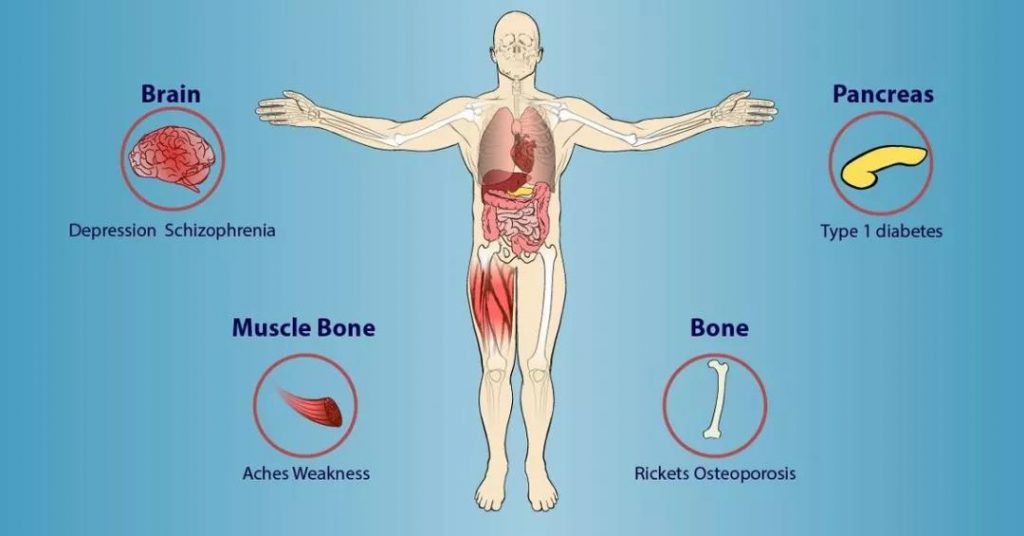
Many people’s first impression of vitamin D is that it can supplement calcium and strengthen bones. In fact, vitamin D is a “health all-rounder.”
A recent study published in the British Medical Journal (BMJ) showed that vitamin D supplementation reduced the risk of autoimmune diseases by 22%. In other words, ensuring adequate intake of vitamin D is conducive to immune regulation.

Vitamin D, the god of immunity
The Brigham and Women’s Hospital research team recruited 25,871 participants (aged 50 years and older) and randomly divided them into two groups: a vitamin D group and a placebo group.
The researchers followed the participants for about five years to measure the development of their autoimmune diseases, including autoimmune thyroid disease and rheumatoid arthritis.
Across the trial period, 123 participants in the vitamin D group were diagnosed with an autoimmune disease, compared with 155 in the placebo group, a relative rate 22% lower.

“In animal studies, we know that vitamin D has a variety of benefits for the immune system,” said Karen Kirstenbard of Brigham and Gynecology Hospital in the US. “But we’ve never shown that vitamin D supplementation can Prevent autoimmune diseases.”
This result provides the first evidence of a causal relationship between the two.
Overall, this large clinical trial suggests that long-term vitamin D supplementation may help prevent autoimmune disease, at least in people over the age of 50.
Prior to this, the British Natural Immunology magazine also published an article that vitamin D plays an important role in immunity.
The study found that without vitamin D, T cells did not take action even if they detected a foreign body, and remained inactive. This finding suggests that the immune response can be controlled by regulating the amount of vitamin D in the body.
Vitamin D is a “healthy all-rounder”
In addition to strengthening bones and regulating immune function, vitamin D provides the following benefits:
Anti-cancer
A 20-year study of 140,000 people published in the British Medical Journal found that plasma vitamin D levels were inversely associated with cancer risk, with liver cancer being the most closely related, with a 55% lower risk.

Protect the heart and brain
Vitamin D regulates blood pressure, improves heart function, and reduces the risk of heart disease and stroke. Adequate intake of vitamin D can reduce the risk of premature death by 30% in patients with cardiovascular disease.
Improve mood
Vitamin D supplementation in women with moderate to severe depression improves, possibly because vitamin D improves serotonin levels, which are important for better sleep and a sense of well-being.
Protect mother and baby
Mothers with lower vitamin D levels during pregnancy were more likely to have preeclampsia, preterm birth, low birth weight babies, and a higher chance of caesarean section.
Mothers who are deficient in vitamin D are more prone to respiratory diseases such as asthma and have higher rates of obesity. Vitamin D supplementation reduces asthma and respiratory infections.
Prevent diabetes
Recent epidemiological studies have shown that higher levels of vitamin D in the blood are associated with a lower risk of diabetes because vitamin D stimulates the body to produce more insulin.
6 types of people most likely to be deficient in vitamin D
The doctor reminds that in clinical practice, it is often found that the following people are prone to lack of vitamin D and need to be vigilant:
pregnant and breastfeeding women;
breastfed infants;
people who spend most of their time indoors;
Seniors aged 65 and over;
People with darker skin (their skin is less able to produce vitamin D from sunlight);
Obese people (their body fat binds to vitamin D, preventing it from entering the bloodstream).
A blood test can determine whether vitamin D is deficient, and it can be tested once a year in a physical examination (this indicator is abbreviated as serum 25-OHD on the test sheet).
If you find that you have the following problems, you should also suspect the possibility of vitamin D deficiency:
Often there is inflammation or infection after inflammation is not easy to get better; feeling depressed, especially in winter; always feeling tired; joint pain, limb weakness; feeling muscle pain.
3 Ways to Supplement Vitamin D
“Advanced in the kitchen, later in the pharmacy”. There are three options for vitamin D supplementation:
Bask in the sun
The best way to get a vitamin D supplement is to get some sun exposure.
The daily sun exposure time for adults is 30 minutes to 1 hour; infants and children have delicate skin, and the time can be shortened to 15 to 30 minutes; the ability of the elderly to synthesize vitamin D is reduced, and the time can be appropriately extended, but it should not be exposed to the sun.

When basking in the sun, expose your forearms, hands, and calves. Sunning through the glass, the UV transmittance is insufficient, which is not conducive to the body’s synthesis of vitamin D. It is best to go to an outdoor environment with better greenery.
Supplemented by food
In natural foods, oil-rich fish, especially salmon, sardines, tuna, dried mushrooms, egg yolks and animal offal contain vitamin D, which can be supplemented in a targeted manner, but the effect is better than that of sun exposure.
Take vitamin D supplements
In order to meet the needs of the body, children, pregnant women, the elderly, etc. can take vitamin D supplements under the guidance of a doctor.
The principle of vitamin D supplementation is: there is no need to supplement it, and it needs to be supplemented to the normal level when it is lacking.
Vitamin D synthesized by sun exposure to the skin is self-limiting and generally not overdose, but it is possible to overdose with supplements.
The maximum tolerable intake of vitamin D is 20-50 micrograms per day. Excessive vitamin D intake can raise blood calcium levels, which in the long term can increase the risk of kidney stones, arrhythmias, and more.
Comments